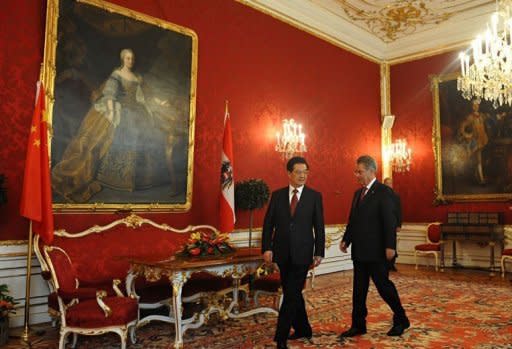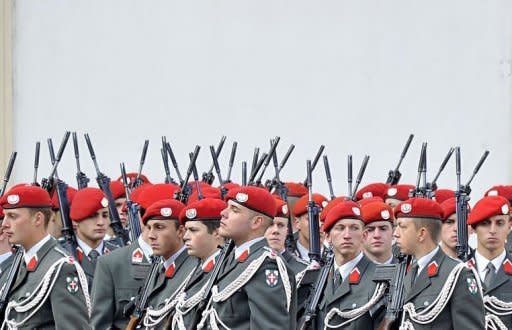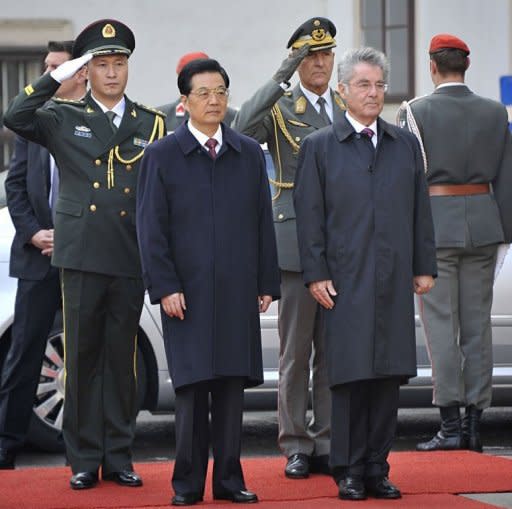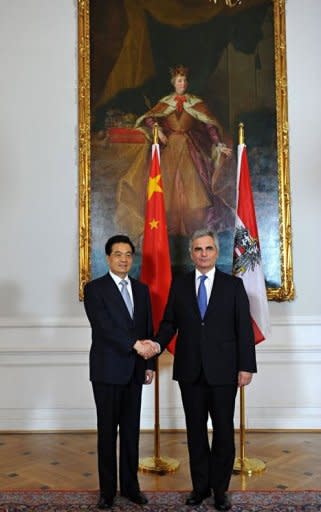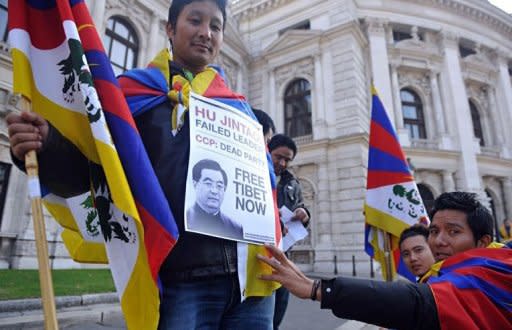China pledges 'active support' for debt-stricken Europe
China pledged active support for debt-stricken Europe and said it was convinced the EU could work through its current crisis as President Hu Jintao visited Monday ahead of a G20 meeting. "All countries sit in the same boat. We have to stick together, so that Europe can recover," China's Trade Minister Chen Deming, who was traveling with Hu, was quoted as saying by the Austria Press Agency. Vowing "active support" for the region, he also hinted at investments from Beijing at an Austrian-Chinese economic forum in Vienna, without specifying whether these would go into the EU's debt rescue fund. Earlier, Hu said that China "is convinced Europe has the wisdom and the competency to overcome the current difficulties. "We are closely following the economic developments" in Europe, he said through an interpreter, after talks with Austrian President Heinz Fischer. Hu's two-day state visit to Austria marks 40 years of diplomatic relations between the two countries. The trip, Hu's second to Europe in a year, also comes as the region is struggling with a spiralling debt crisis and amid hopes that Beijing might invest in its bailout fund. After his Austrian visit, Hu will travel Wednesday to the French resort of Cannes to attend a G20 meeting of world leaders on Thursday and Friday. European leaders called on China last week to invest in the region's European Financial Stability Facility (EFSF) to help it overcome the debt crisis. Klaus Regling, the head of the bailout fund, travelled to Beijing to strike a deal with the world's second-largest economy, reportedly seeking a pledge of $100 billion (71 billion euros). However, Beijing had remained non-committal about its involvement, and Vice Finance Minister Zhu Guangyao played down hopes of a breakthrough at the G20 meeting, insisting that investment in the fund was not on the agenda. In Monday's talks, Fischer and Hu discussed the upcoming G20 meeting, as well as bilateral economic and cultural ties, Fischer told reporters. The Chinese president's visit "comes at a time of great significance for China as well as Europe and Austria, where important decisions are needed and where the partnership between China and Europe is especially important," he noted. Fischer said he had also brought up the question of human rights but did not elaborate. Neither he nor Hu took questions from the press. Chancellor Werner Faymann meanwhile noted that the Chinese president was very curious to know how EU leaders had agreed to last week's deal to save the euro. "Both sides recognised the need to find belt-tightening measures as well as investment programmes as an answer to the crisis," he said in a statement after the meeting. Hu and his wife Liu Yongqing arrived in Vienna Sunday and the visit began officially Monday as he held talks with Fischer and the two oversaw the signing of seven bilateral agreements in areas such as energy efficiency, environmental protection, hydropower and cultural exchanges. Hu and his wife were received with full military honours at the former Imperial Palace by Fischer and his wife Margit, and later attended a state banquet. Tuesday will be dedicated to sightseeing, with a visit to the scenic Salzkammergut region, a short lake cruise in St Gilgen and a classical concert at the former Salzburg home of Wolfgang Amadeus Mozart. Hu's visit to Austria, only the second by a Chinese president after Jiang Zemin in 1999, follows an invitation by Fischer, who travelled to Beijing last year. Foreign trade between the two countries amounted to 8.2 billion euros in 2010, and Fischer said Monday he hoped it would double within the next five years. China, which reportedly sent a 160-strong delegation to accompany Hu, is especially keen on Austrian know-how in areas like infrastructure, transportation and environmental technology. Vienna meanwhile sent a stream of ministers to Beijing this year for talks and business deals, including Chancellor Faymann and Foreign Minister Michael Spindelegger, who also made a point of meeting political activists like artist Ai Weiwei. On Monday, the Tibetan community in Austria held several small protests both in Vienna and Salzburg, despite tight security. A pro-Tibetan protester was also jostled by pro-China demonstrators who tried to snatch her Tibetan flag, witnesses said.

